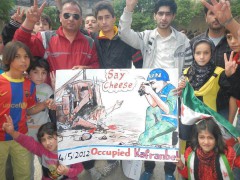United Against Violence

Photo of participants at the International Conference on Non-Violence, in Tunis. Taken from the Foundation for the Future website
On 1-3 November I participated in the International Conference on Non-Violence in Tunis, where activists, academics and journalists from the north and the south of the Mediterranean met to discuss regional strategies to support non-violent activism and democratic transition. The conference aimed to strengthen solidarity and partnership between non-violent civil society actors in both regions, and asked participants: How can we achieve real dialogue and inclusive democracy between people with different political and social ideologies?
United against violence
I was excited to join activists from MENA countries such as Morocco, Libya, Tunisia, Lebanon, Syria, Palestine, Jordan, Iraq, Bahrain and Yemen, and from European movements like the Spanish ‘May 15’. When I get invited to this kind of meeting I usually fear that we will stay trapped in a talking shop without managing to come up with specific working plans and initiatives, so I was happy when we moved away from analyzing the situation in each of our countries – which most of us are already familiar with – to more concrete examples of how we can unite against violence. These are some of the campaigns mentioned:
- The Pact of Tunis
- The March of Mothers´strike
- The Global Campaign against Arms trade
- The Global Campaign on Human Rights for Bahrainis
- The Global March for Syria
- Camp against settlements
Citizen networks and international solidarity
I was invited to talk about Syria, so I used this opportunity to reflect on international solidarity with Syrian civil society. During 2011, citizen solidarity helped ignite change throughout the region and the rest of the world, but over the last months citizens have witnessed attempts to divide social movements and focus on what separates us, not on our common bonds and shared values. Here are some reflections that I shared on how to fight this trend.
- Let´s listen to citizen voices. To different, diverse citizen voices. Especially to young citizens who are leading movements and changes that the older generations didn’t consider possible. From the people of Karanbel to the Local Coordination Committees (whose members risk their lives to organize resistance, document and report it) activists´voices are now easier to reach than ever.
- Let´s silence governments that silence citizens. Governments that kill, torture and silence journalists are not reliable. Let´s not go to them for quotes and insights on how to solve the problems that they created.
- Language is sensitive. Language contributes to configuring and (de)legitimizing our movements, so it is important to be aware of its implications. Dictator vs. president, thugs vs. authorities, Assad´s army vs. security forces, revolution vs. civil war are some examples on how sensitive vocabulary is.
- Let´s build our own networks: The Internet enables bonds and interactions that were well nigh impossible until only recently. Let´s use all the tools at our disposal to work together and join efforts. Coordination and citizen bonds have been crucial for revolutions to spread the way they did during 2011, and we should continue to empower ourselves through those connections.
- Let´s focus on the universal values our movements stand up for: freedom of expression, social justice, women´s rights, combating corruption, and non-violence. Let´s not fall into geostrategic traps, let´s stay away from the view of the world “in two blocks” (“imperalist” vs. “anti-imperialist”) which does not mesh with our complex and diverse realities. Human rights do not belong to any particular people, group or country, and nor do those who abuse them.
Tags: Assad, international conference on non violence, syria, tunis, violence

